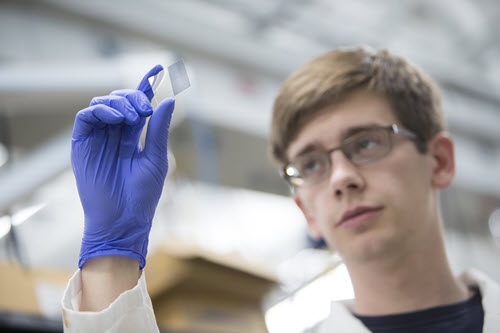Serious undergraduate research your first year
First-year Research Immersion (FRI) is a groundbreaking program that gives first-year STEM (Science-Technology-Engineering-Mathematics) students the opportunity to combine their academic studies with the experience of conducting real research, investigating important problems that yield publishable results in multiple research areas.
This three-semester program begins with a Research Methods seminar in the fall of
the first year, which is followed by two Research Stream courses. In the Research
Stream courses, students learn research techniques, acquire background on a research
question and follow through on the initial phases of a real research problem.
Why a three-semester program?
Scientific research is analogous to needing several courses to acquire proficiency in a foreign language. Students need the FRI sequence to obtain a deeper understanding of the process of science and how to apply that successfully. Accordingly, the three-course FRI sequence replicates the best of junior-senior "independent study" research experiences for substantial numbers of our first-year students via step-wise progression and highly structured mentoring.
Faculty in teams of three to five design and oversee the research experience for each Research Stream. New laboratories have been designed, constructed and outfitted to provide the innovative infrastructure for undergraduate students to conduct cutting edge research in the Research Stream they are placed into.
Students are well-positioned to continue research in faculty laboratories and obtain summer internships after FRI, all of which prepare them for future careers in sciences and engineering.
The only program of its kind
Binghamton has the only FRI program with teams of faculty researchers designing and overseeing the research streams. Consequently, students get to know several faculty early in their college experience. Binghamton has the only FRI program that admits students at the outset into a research stream, which means students and faculty start working together in the first semester, and thus students have three semesters to develop mentor-mentee relationships and a peer-support community.
Nationally, STEM education research shows the importance of these elements in helping students clarify career goals, instill confidence that they can succeed in science and engineering, and facilitate an understanding of how to plan for the rest of their college experience and beyond. Binghamton's FRI emphasizes collaborative and teamwork skills, the very skills that employers say they want in college graduates.
Sponsors and Collaborators
We thank the Howard Hughes Medical Institute, New York State Regional Economic Development Council, SUNY IP Fund, SUNY EIP Fund, SUNY PIF Fund and National Science Foundation Geopath-Extra for their support.
Binghamton University has committed to FRI in terms of strategic vision, academic support, facilities and financial resources. With such a substantial commitment, the University also realizes a great need to seek sponsors and collaborators to continue funding the program long-term and instructing tomorrow's professionals, researchers and educators.
Research in Science Education
Our FRI program is aligned with the national initiative for transforming undergraduate STEM education, which is based on over 20 years of research about how students learn and how to engage students in careers in science and engineering. A central feature of this initiative is that students, including non-STEM majors, have authentic research experiences early and then throughout their college years.

FRI Clean Energy studentThis course is definitely one that anyone considering a career in research should take because it allows the students to get into the lab and do actual hands-on research in the first year. This way, those considering research do not have to wait until junior year to realize that maybe that is not exactly what they want to do. In addition, it also provides a way of possibly transitioning into a research group in the sophomore year for those students who wish to pursue research beyond the course. To conclude, this course is an excellent opportunity, and a great way to provide students with the experience they should receive before their third year of college.